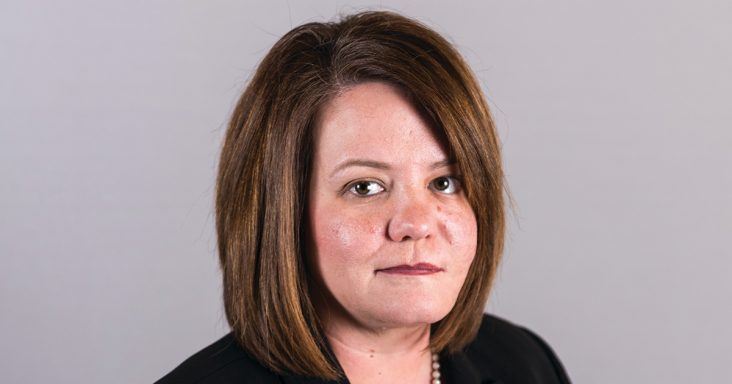Andrea Allen is searching for angels
by May 19, 2019 8:09 pm 1,394 views

Andrea Allen is the executive director of Arkansas State University’s Delta Center for Economic Development. The center is home to the Small Business Technology Development Center, Arkansas Manufacturing Solutions and Communities Unlimited. Collectively, they partner in an effort to share a holistic Community Economic Development approach with communities and entrepreneurs in a 12-county radius in Northeast Arkansas.
Allen, a 1997 ASU alumna with an extensive background in community development and governmental expertise, has been with the center since 2016 after serving for five years on the staff of U.S. Rep. Rick Crawford, R-Jonesboro.
Talk Business & Politics CEO Roby Brock quizzed Allen on where she sees opportunities and threats for the region and how the Delta Center for Economic Development is serving as a catalyst to advance Northeast Arkansas’ economy.
Roby Brock: Where did you grow up, what have you done along the way, and how did you find your way to Arkansas State University?
Andrea Allen: I grew up in the twin cities of Walnut Ridge and Hoxie, small, Delta towns in Lawrence County. I lived in Walnut Ridge, but I attended church and school in Hoxie. I loved both towns and still believe there was no better place to grow up.
I also attended Williams Baptist College before going on to Arkansas State University to receive my B.A. in Political Science. Right out of college, I went to work for then U.S. Sen. Tim Hutchinson, and the majority of my career has been spent in some form of public service at the local, state and federal levels of government.
While this will date me, I now have around 23 years of public service and have learned the roles, firsthand, of local, state and federal government. Coming home to Arkansas State University and working at the Delta Center allows me to use the knowledge I have gained over the years to pursue my passion of helping our small, Delta towns find their way back to prosperity.
Brock: The Delta Center has been in existence for some time and its mission has grown. Today, where do you think the center is making its biggest impact?
Allen: When I was named executive director of the Delta Center, I read the original strategic plan for the Center. It seems as though the more things have changed, the more the economic development needs have remained the same. For me, I believe the biggest impact is just around the corner when we start our executive education program. I can’t stress enough the need for continuing education programs due to constantly changing technology. Several years ago, the Delta Center contracted with ASU-Newport to provide workforce training classes. This will continue and is critical, but the need for continuing education programs such as project management, data analytics, leading Millennials, negotiations, and on and on, is needed, and I look forward to being able to offer these classes in the very near future.
Brock: There are always needs for new services and assistance. What, if anything, is in the works or coming online that may be new to your toolbox?
Allen: Act 581 of 2017 requires local governments to obtain a third-party economic impact analysis before appropriating dollars for an economic development project. The Economic Development Administration University Center designation and grant allowed us to purchase software to provide this service free for the 12 counties named in the University Center designation, and we just received access to the software last week. This will also help local governments, economic developers, business, industry and investors make wise investment decisions and better communicate them.
Brock: Existing businesses and new businesses – basically business growth and entrepreneurship – are two paths you frequently travel with the center’s mission. Let’s begin with business growth. Where do you see strength and weakness in the region for existing businesses?
Allen: In terms of strengths, number one would be education and training. From Arkansas State University, Williams Baptist College, Lyon College, and a multitude of community colleges, and federal and state funding partners, NEA can educate, train, and continue educating and training our workforce as technology advances. Number two, involves transportation. NEA continues to gain better access to markets through I-555 and the future I-57 providing more opportunities for our existing businesses. Three, our cost of living as well as cost of doing business is low.
As far as weaknesses, I believe we must do a better job of soliciting the thoughts of our younger generation. The workplace of 15 to 20 years ago is not the workplace the Millennials are wanting. We need to work with them and adapt, or I fear we could lose our Millennials to other regions.
Brock: And on the new business front. What do you see happening or what do you think needs to happen to further jump-start entrepreneurship in NEA?
Allen: Two words: angel investors. NWA and Central Arkansas are blessed with a great network of angel investors to help new start ups. This is the greatest need I see in NEA with regard to jump-starting entrepreneurship. We have the pieces in place to help innovators and entrepreneurs further their ideas, make a prototype, write a business plan, etc. through A-State Innovate, A-State SBTDC, and Arkansas Manufacturing Solutions. But once the product is ready for commercialization, access to capital can be an issue. Northeast Arkansas angel investors are needed.
